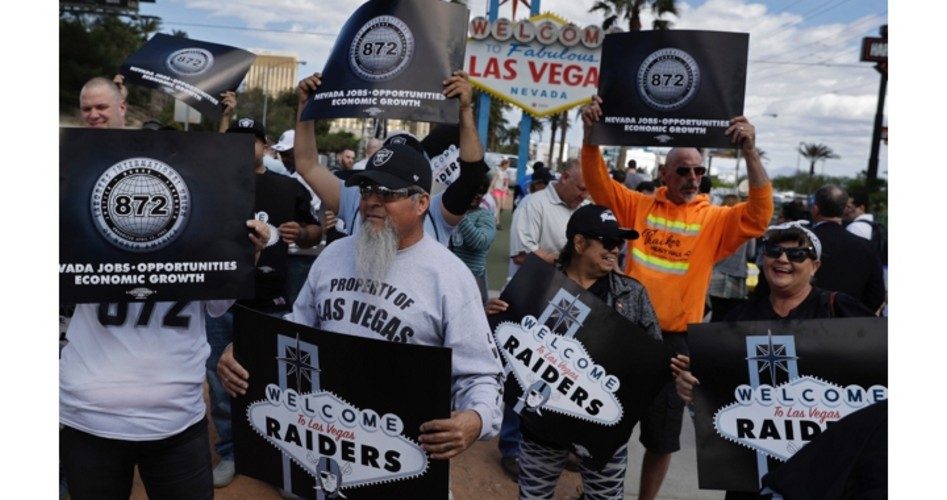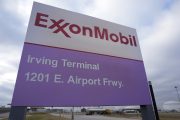
“I am proud that we stood firm in refusing to use public money to subsidize stadium construction,” said Oakland Mayor Libby Schaaf in reaction to the decision of the National Football League (NFL) to allow the Oakland Raiders franchise to relocate to Las Vegas, Nevada. The NFL owners voted 31-1 to approve the move, in which the Las Vegas taxpayers will cough up $750 million in public funds to “assist” Raider owner Mark Davis in building a new stadium.
The NFL owners regularly demand multi-million subsidies from municipalities to build new stadiums, or remodel old ones. Judith Grant Long, an urban planning professor at Harvard, stated that about 70 percent of the bill for these sports complexes are paid for by local taxpayers. Long also contends that 13 teams have garnered an actual profit off stadium subsidies, receiving even more money than what it costs to build the stadiums.
In Cleveland, on three major sports facilities, including one for the NFL Browns, the taxpayers paid 75 percent of the bill — about $825 million.
NFL Commissioner Roger Goodell expressed disappointment that Oakland would be losing its Raiders football team, but argued the move was important for league “stability.”
Goodell, who has pocketed over $105 million in the past five years as the NFL’s commissioner, said, “You know our goal is to have 32 stable franchises for each team and the league. We work very hard and never want to see the relocation of a franchise. We worked tirelessly over the last nine months or so on a solution. We needed to provide certainties and stability for the Raiders and the league.”
And that “certainty and stability,” once again has come at the expense of taxpayers in NFL cities. The game is pretty simple. If the city will not extract money from its citizens to pay for the stadium upgrades, then the NFL team will just “take its ball and go elsewhere.”
“My father used to say the greatness of the Raiders is in the future,” Davis said, referring to Al Davis, who once owned the iconic NFL team. “This gives us the ability to achieve that.”
No doubt it does. Most business owners could achieve quite a lot of “greatness” with a $750 million “contribution” to their enterprise. State and local politicians join in that “greatness,” by claiming that their “leadership” brought a franchise to the city and state or kept it there. Local politicians who oppose the subsidies are then cast as being “against greatness.”
But it is not just taxpayers in the cities who wind up paying for stadium expansion for billionaires. For example, according to a report by the Brookings Institute, 68 percent of the financing for the new Yankee Stadium in New York City was through tax-exempt municipal bonds. (In contrast to the original Yankee Stadium, known as “The House That [Babe] Ruth Built,” this stadium was the house that working stiffs in New York City built). These municipal bonds are also exempt from federal taxes, meaning that the Yankees owners were, in effect, the recipients of a federal subsidy to build their new facility, to the tune of $431 million.
Since 2000, 45 major league sports teams have either been built or have undergone major renovation. Thirty-six of them have been on the receiving end of subsidies from these tax-exempt municipal bonds.
And it is not just football. In Chester, Pennsylvania, the city provided 97 percent of the money for a new soccer stadium, with a price tag of $117 million. Wisconsin Governor Scott Walker supported using $250 million from the Badger State’s taxpayers to construct a new facility for the National Basketball Association’s Milwaukee Bucks. Jon Hammes, a partner in the investment group that owns the Bucks, was a national finance co-chairman for Walker’s presidential campaign. Former Florida Governor Jeb Bush supported taxpayer subsidies for a new ballpark for the Miami Marlins baseball team when he was that state’s chief executive. But when he then ran for president, Bush loudly denounced crony capitalism.
During the 2016 presidential campaign, Republican hopeful Carly Fiorina raised the issue of “crony capitalism.” According to Fiorina, “What we have now is less and less free market, and more and more crony capitalism.” The Cato Institute estimates that crony capitalism costs taxpayers $100 billion per year. While its advocates often tout the visible effects of such spending, it distorts the normal workings of the free market, hurting many other businesses and consumers (who usually do not even know that they are paying higher prices and higher taxes because of it).
This tendency of politicians to support crony capitalism is on display every four years in Iowa, during the campaigning in that state’s first-in-the-nation caucuses. Candidate after candidate routinely supports ethanol subsidies (very popular with Iowa’s corn farmers). Interestingly, Senator Ted Cruz won the Iowa caucuses even after opposing the subsidy. (Senator Rand Paul also bravely refused to support the subsidy).
The term crony capitalism may be new, but the practice of using the power of government to obtain a competitive advantage for politically-connected businesses is not. When President Andrew Jackson vetoed the rechartering bill for the Second Bank of the United States, he wrote in his veto message, “It is to be regretted that the rich and powerful too often bend the acts of government to their selfish purposes …. Every man is equally entitled to protection by law; but when the laws undertake to add to these natural and just advantages artificial distinctions, to grant titles, gratuities, and exclusive privileges, to make the rich richer and the potent more powerful, the humble members of society — the farmers, mechanics, and laborers — who have neither the time nor the means of securing like favors to themselves, have a right to complain of the injustice of their government .… Many of our rich men have not been content with equal protection and equal benefits, but have besought us to make them richer by act of Congress.”
So, when Raiders owner Davis praises the actions of the Las Vegas city government in making him such a generous offer — a “gratuity” in the words of President Jackson — by saying, “The opportunity to build a world-class stadium in the entertainment capital of the world is a significant step toward achieving that greatness [his father Al had hoped for with the Raiders franchise],” we should understand that achieving such “greatness” is much more difficult for the small business owner. After all, most small business owners would likewise achieve “greatness” if they too could get a $750 million subsidy.
It is a difficult task to end the practice in today’s political atmosphere. After all, if Oakland won’t give the billionaire sports owner his subsidy, he can always find a Las Vegas that will. And the office holder who refused to support subsidizing the sports team billionaire owner will find himself under demagogic attack.
The authors of the Brookings Institute study offered one possible solution. If Congress were to end the “private payment test,” and also the practice of federal tax-exempt funds being used on buildings whose primary function is “private business use,” then the subsidizing of sports franchises might be somewhat reduced. At least the federal taxpayer in Montana would not be subsidizing the Davis family’s move to Las Vegas.
Another solution that has been offered is for the taxpayer subsidies to be considered taxable income by the federal government.
Meanwhile, Raiders fans in Oakland will have to accept the loss of their team. But owner Mark Davis did offer them some consolation. If they had already purchased season tickets before the announcement of the future relocation (in 2019 or 2020) to Vegas, then he has offered them a full refund.
It is the least he could do.
Photo of members of a laborers union celebrate Raiders move to Las Vegas: AP Images



